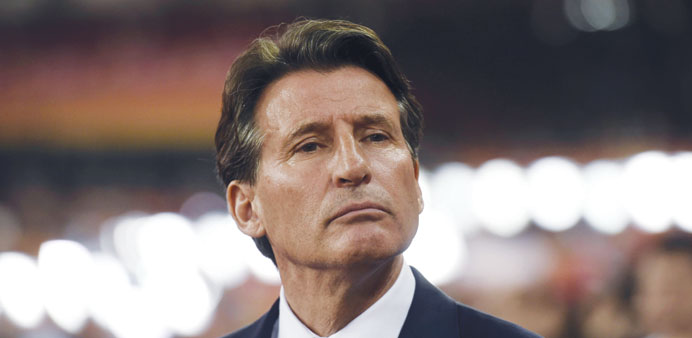Reuters/London
Sebastian Coe, the head of world athletics, said he had given the Russian athletics federation until the end of the week to respond to a report into alleged widespread doping in the country that could lead to their suspension from the Olympic Games.
The independent commission of the World Anti-Doping Agency (WADA) yesterday recommended banning Russia from the sport as a result of its systematic doping culture that “prevented or diminished the possibility of an effective anti-doping programme”.
“I will seek an explanation for the allegations and the (IAAF) Council will then make a judgement,” Coe told journalists.
The IAAF Council has the power to act on the recommendations and ban Russia from sanctioned events, including next year’s Olympic Games in Rio de Janeiro and the 2017 world championships in London.
“The commission’s report is alarming,” added Coe, who said the scope and depth of its revelations was beyond anything he had expected. “We have received it only today and are still absorbing it,” he said of the 320-page report which was also critical of the IAAF and said it had more to say in the future about the governing body’s failures.
“We will investigate and if we find failures in our governance we will act,” added Coe, who took over as president in August following the retirement of Lamine Diack, who was last week arrested in connection with doping cover-ups.
“Dick Pound (report author and former head of WADA) said in the report that this was not IAAF policy but rogue individuals who have inserted themselves into the organisation. If there are issues we have to absorb then we will but the report did also say that this is not limited to track and field and not limited to one country.”
On Sunday, Coe had said that his instinct was against banning Russia but on Monday he said the scale of the doping regime exposed by the report meant that the IAAF Council should consider the recommendation for such a ban.
Pound agreed with the suggestion that the Russian situation amounted to “state-sponsored doping” but Coe declined to compare it with the Stasi-backed regime that turned East Germany into a sporting superpower in the 1970s and 80s.
“I’m not benchmarking this against anything,” said the double Olympic 1500 champion who won the first of his titles at the 1980 Games in Moscow.
IOC recommends suspension of Diack
The International Olympic Committee’s Ethics Commission recommended the provisional suspension of Lamine Diack as an honorary member of the IOC yesterday.
Diack, who was an IOC member from 1999 to 2013 as head of athletics world governing body IAAF and became an honorary member in 2014, is being investigated by French authorities on suspicion of corruption and money laundering.
The 82-year-old Senegalese is alleged to have received more than one million euros ($1.1 million) in bribes in 2011 to cover up positive doping tests of Russian athletes.
His son Papa Massata Diack and three others have also been charged with various alleged breaches of the IAAF’s Code of Ethics.
Diack was a powerful figure within the IOC as he controlled one of the most popular Olympic sports for more 15 years with athletics also a big beneficiary, along with swimming, of the IOC’s Olympic Games contributions.
The IOC suspension came minutes before a World Anti-Doping Agency (WADA) independent commission news conference on its report on allegations of doping among Russian athletes.
Commission chairman Dick Pound was set to address media in Geneva later on Monday to present their findings over allegations made during German broadcaster ARD’s December 2014 documentary on doping in Russia.

Sebastian Coe
